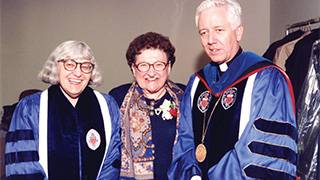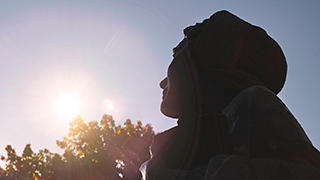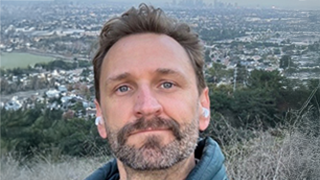Leading With Love: Thering, Forsberg and Kaufman Featured in NJ Women of Interfaith Dialogue and Holocaust Education Program
Tuesday, October 22, 2024

Sister Rose with Cynthia Ozick and then President of Seton Hall Monsignor Sheeran, from one of the Evening of Roses Galas.
Last April’s “NJ Women of Interfaith Dialogue and Holocaust Education” presentation from Session I: Women and Gender in the Archives of the Conference at Seton Hall University celebrated the lives and legacies of three remarkable women: Sister Rose Thering, Nancy Forsberg and Luna Kaufman. These women helped shape both interfaith relations and Holocaust education standards in New Jersey. Their influence continues to resonate through education, interfaith dialogue and the preservation of their contributions in Seton Hall University’s archives.
The Archives and Special Collections Center at Seton Hall, through a project titled "Feisty Women in Interfaith Dialogue: The Second Vatican Council Years," funded by the New Jersey Historical Commission, recently reprocessed and rehoused the collections of these three women. Through this process, archivists and an academic audience have gained valuable insights into how these women contributed to the development of Holocaust education in New Jersey, ensuring their legacies are preserved and accessible for future generations.
The project research revealed how women’s activism helped reshape interfaith conversations while transforming education practices in the state. Athena Frade, the primary archivist who processed the materials, brought these collections to life. “It was humbling to see and reprocess three lifetimes of work on the subjects of antisemitism and interfaith dialogues, and recognize the products of that work,” she said. “It is one thing to catalogue their efforts to bridge these gaps, and it is another to realize that the education and curriculum I received growing up in New Jersey public schools was very directly influenced by these women.”
Reflecting on her experience as project supervisor, Jaquelyn Deppe, librarian and archivist in the University Library Dean’s Office, said, “Athena did the heavy lifting, but seeing the lives of these women unfold through the archival materials was incredible. Their work was instrumental in shaping education standards and interfaith relations in New Jersey.”
Sister Rose Thering made significant contributions to the Vatican II reforms, particularly in fostering interfaith understanding between Catholics and Jews. Her doctoral research on the portrayal of Jews in Catholic textbooks played a role in shaping Nostra Aetate, the declaration that transformed the Catholic Church’s relationship with non-Christian religions.
Nancy Forsberg, a pastor and founder of the Union Interfaith Committee on Holocaust Awareness, was also instrumental in the push for Holocaust education in New Jersey. Forsberg worked tirelessly to integrate Holocaust studies into public school curricula, and in 1994, New Jersey became the second state to mandate Holocaust and genocide education. Soon after, young students were presented topics like “The Self and Others,” “Dislikes and Prejudice” and were required to define “The Holocaust.” Older students learned to identify and understand what propaganda was, how it was used in both the Holocaust and other genocides, and distinct types of resistance in the face of genocide.
Luna Kaufman’s life was a testament to resilience and activism. A survivor of the Holocaust, Kaufman dedicated her later years to advocating for Holocaust education in New Jersey. She served on the Advisory Council for Holocaust Education and collaborated closely with Sister Rose Thering, using her firsthand experiences to educate students about the atrocities of the Holocaust.
Deppe noted that each of the women was inspiring. “Luna Kaufman, a Holocaust survivor, dedicated much of her life to ensuring the teaching of Holocaust education in New Jersey. Nancy Forsberg, a pastor, was committed to this cause, establishing Holocaust education programs in Union County. And then there’s Sister Rose Thering, who was at the forefront of the fight against antisemitism and worked tirelessly to improve interfaith relations between Christians and non-Christians.”
Seton Hall’s commitment to interdisciplinary study is highly reliant on interfaith collaboration, and the work these religious women did together provides a shining example. Each woman came from a different faith background, yet they shared a common goal: to educate future generations on the horrors of the Holocaust and the importance of interfaith understanding.
Their paths often crossed in the United States and abroad, and through their collective efforts, they left an indelible mark on New Jersey’s education system. Today, Seton Hall continues to foster this tradition of interfaith dialogue through courses, programs and events that draw upon Kaufman, Forsberg and Thering’s rich legacy.
Deppe noted that emphasizing tolerance, empathy and collaboration with modern students were crucial elements of education that are more important now than ever. Indeed, the three featured women were from different religious traditions—Catholic, Protestant and Jewish—and promoted tolerance and empathy across cultural divides. “Many of the conversations happening in the archival collections are still relevant today,” she said. “One of the key takeaways is the importance of interfaith relationships and how people of all faiths can work together to achieve common goals.”
The reprocessing of their archival collections at Seton Hall involved meticulous work, ensuring that their legacies are preserved for future scholars and students. The collections were rehoused in chemically neutral folders and boxes to prevent deterioration, and photographs placed in protective sleeves for easier handling and long-term preservation. “We are so pleased to make these collections more accessible,” said Sarah Ponichtera, assistant dean of collections and gallery. “These women, from different faith traditions, came together to promote tolerance and empathy across cultural divides. I hope their stories inspire our community to see the positive impact that people can have on the world when they lead with love.”
Categories: Education, Faith and Service





